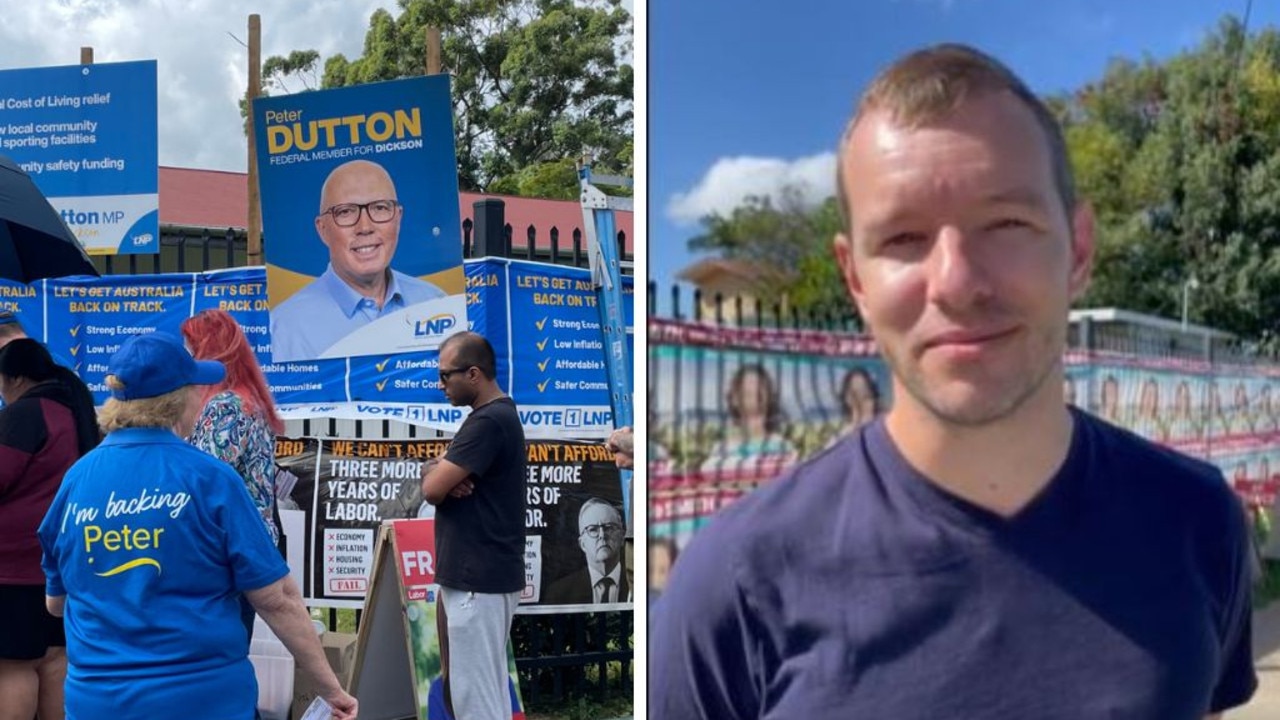Melbourne earthquake felt across Canberra, Sydney, Tasmania, SA
An earthquake that was felt across southeast Australia has caused serious damage at a popular Melbourne shopping precinct, with Victorians warned to brace for aftershocks.
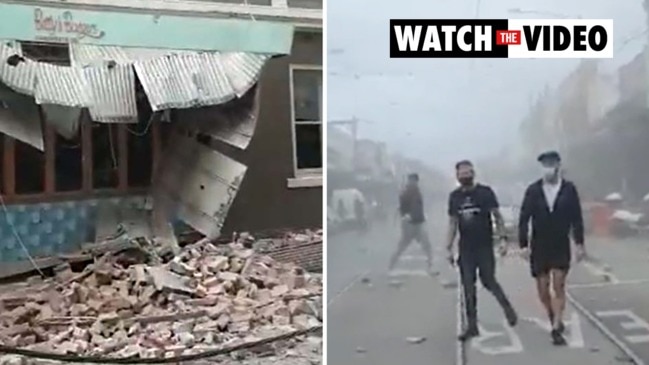
National
Don't miss out on the headlines from National. Followed categories will be added to My News.
Melbourne’s main shopping strip has been likened to a “war zone” after an earthquake created chaos on Wednesday morning.
Victoria’s strongest earthquake since measurements began sent shockwaves through the state capital that were also felt as far as Canberra, Sydney and Adelaide.
A corner of Chapel Street in Melbourne’s inner Windsor suburb became littered with fallen bricks after the magnitude 5.9 tremor hit near the regional town of Mansfield at 9.15am.
“It’s like a bomb went off, the outside awnings are gone and it’s all over the street, it feels like it’s a bit of a war zone,” Betty’s Burgers managing director Troy McDonagh told the Herald Sun.
The burger chain’s Chapel Street restaurant was damaged by the earthquake and part of a wall crumbled and fell on the street below.
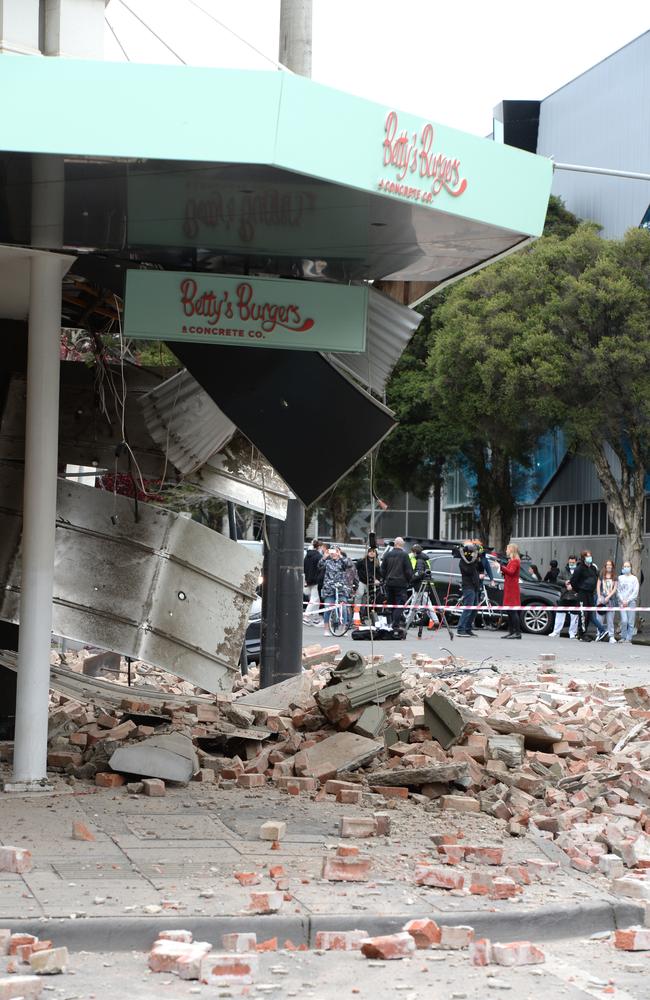
The first earthquake occurred at a depth of 10km at about 9.15am AEST.
It followed by three aftershocks — a magnitude 5.5 quake at 9.40am, 4.0 quake at 9.55am and 3.1 quake at 10.15am.
The tremor was felt across southeast Australia.
Victorians are being encouraged to monitor the VicEmergency map in the event of becoming trapped under debris during an aftershock, with Deputy Premier James Merlino warning the state to be on high alert.
“Geoscience have confirmed there is a possibility we may receive further aftershocks and potential risk of further earthquakes,” he said.
Victorian emergency services responded to dozens of incidents of building damage across the state, the Herald Sun reports.
Victoria’s State Emergency Services said anyone with building damage or SES assistance has been urged to call 132 500 and wait as lines may be busy.
Residents in Melbourne’s north lost power following the earthquake, with outages reported in Coburg, Coburg North, Pascoe Vale, Pascoe Vale South, Preston and Reservoir.
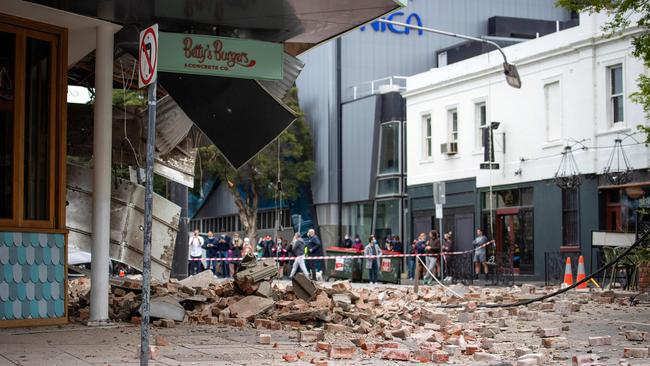
There were also reports the tremor was felt in Sydney, Canberra, Tasmania and South Australia.
Fire and Rescue crews were dispatched across Sydney, Wollongong and in regional parts of NSW following calls from distressed residents.
“FRNSW has dispatched crews across NSW from Alexandria, Manly and Hornsby in Sydney to as far as Dubbo in Western NSW following reports of tremors felt across the state,” a Fire and Rescue NSW spokesman wrote on social media.
“No reports of major structural damage in NSW have been received.
Just got sent this video from a friend in Melbourne 😳 pic.twitter.com/SWOpRdirkJ
— Tom Steinfort (@tomsteinfort) September 21, 2021
Did Adelaide just have a earthquake? I took this 14 stories up in the city. 😬😬😬 #earthquakepic.twitter.com/J7t174knaJ
— Adrian Dipilato (@AdrianDipilato) September 21, 2021
Staff at Sydney radio station Nova 96.9 reported feeling tremors at their Pyrmont headquarters.
Shakes were also felt at the University of Technology at Ultimo and in Sydney’s south.
“Just had a couple of tremors at Kyeemagh,” one local said.
“Felt the wave motion through the floor and hanging things were swinging,” said another resident.
“I felt it in my apartment, I’m on the 5th floor and the building was swaying enough for me to be swaying, my doors were moving back and front and so were my blinds,” another said.
“It was like a bang, I went outside thinking it was a massive wave breaking or a plane going overhead,” a resident from Sydney’s northern beaches said.
“It was similar to the Newcastle quake but the Newcastle one was stronger.”
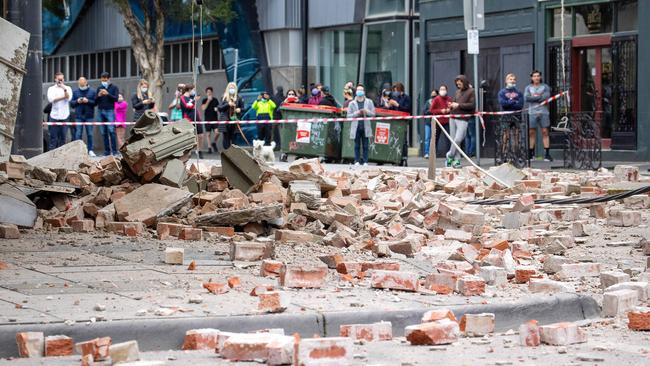
Prime Minister Scott Morrison said he shared text messages with Victorian Premier Daniel Andrews, and the federal government was ready to provide whatever assistance was needed, including from the Defence Force if required.
Speaking from the United States, the Prime Minister said it was a “very disturbing” event but that there had fortunately been no reports of major injuries so far.
“My primary concern is with the earthquake and making sure the response is there for people in need,” Mr Morrison said.
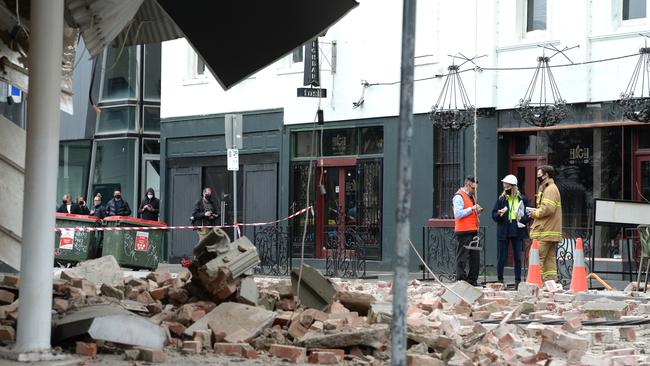
Mansfield Mayor Mark Holcombe told ABC News the tremor was “really strong” and went on for longer than he expected.
“I was sitting down at work at my desk and I needed to run outside, it took me awhile to work out what it was,” Mr Holcombe said.
“I have been in earthquakes overseas … and it seemed to go on longer than I have experienced before.
“The other thing that surprised me was how noisy it was. It was a real rumbling like a truck going past.”
earth tremor felt in launceston (tasmania)
— Martin Flanagan (@Martin_Flanagan) September 21, 2021
A magnitude six #Earthquake has rattled Melbourne and regional Victoria.
— News Breakfast (@BreakfastNews) September 21, 2021
This is the moment when News Breakfast presenters @mjrowland68 and @Tonaaayy_ were rocked by it. pic.twitter.com/Z4gz0sWJve
ABC News Breakfast presenters were live on air when the tremor hit.
“That was a big one,” host Michael Rowland said.
Later he added: “It was quite frightening. I think you would agree.
“We were chatting here in the studio after the show, after we threw to you in the mornings coverage. We were chatting away and all of a sudden the studio started shaking.”
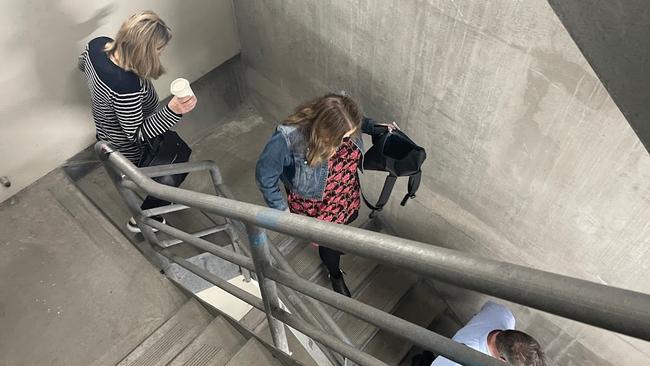
Amid concerns about aftershocks, people in affected areas are advised to stay indoors if they feel an earthquake coming on, to keep clear of windows and to shelter under door frames or strong tables and benches.
People who are outside are advised to stay well clear of buildings, and people in cars are advised to park safely as soon as they can.
After quakes, people are advised to turn off electricity, gas and water, and to minimise their phone calls to avoid network congestion.
Geophysicist Dr Ben Mather from the University of Sydney said today’s quake occurred on the Governor Fault, one of the deepest faults in Victoria.
Usually the western side of the Governor Fault, the Melbourne region, felt less quake activity than the Alpine region to the fault’s east, he said.
“Earthquakes occur as a result of stress building up along a fault plane,” Dr Mather said. “Eventually it reaches a breaking point, leading to a large slippage event, which releases energy.”
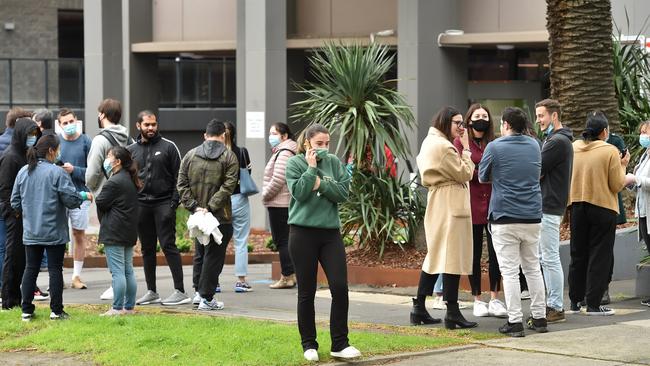
The timing, scale and frequency of aftershocks was difficult to predict, Dr Mather said, but in Australia, they were generally of much smaller magnitude to the original quake.
People concerned about aftershock activity should take sensible precautions such as moving precarious objects to safety and formulating plans about where to take shelter.
“It always pays to be cautious,” he said.
While the epicentre of today’s quake was to the northeast of Melbourne, the Gippsland region has experienced a succession of shakes in recent years, including a 3.4 disturbance in December 2014, one measuring 3.2 in April 2016 and another measuring 3.3 in February 2017. The region to Melbourne’s west is also considered geologically active.
The 400km stretch between Melbourne and Mount Gambier in South Australia is the country’s most active volcanic region, with 400 historical eruption sites. Scientists believe it last erupted 5000 years ago.
The largest earthquake ever recorded in Australia was magnitude 6.7, on March 24, 1970, in WA’s Canning Basin. It caused little damage. Our most destructive was the Newcastle earthquake of December 28, 1989, which measured 5.6 on the Richter scale. Thirteen people died and 160 people were injured.

